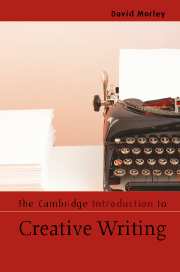Book contents
- Frontmatter
- Contents
- Preface
- Acknowledgements
- Chapter 1 Introducing creative writing
- Chapter 2 Creative writing in the world
- Chapter 3 Challenges of creative writing
- Chapter 4 Composition and creative writing
- Chapter 5 Processes of creative writing
- Chapter 6 The practice of fiction
- Chapter 7 Creative nonfiction
- Chapter 8 Writing poetry
- Chapter 9 Performing writing
- Chapter 10 Writing in the community and academy
- Illustrative bibliography
- Index
Chapter 10 - Writing in the community and academy
Published online by Cambridge University Press: 05 June 2012
- Frontmatter
- Contents
- Preface
- Acknowledgements
- Chapter 1 Introducing creative writing
- Chapter 2 Creative writing in the world
- Chapter 3 Challenges of creative writing
- Chapter 4 Composition and creative writing
- Chapter 5 Processes of creative writing
- Chapter 6 The practice of fiction
- Chapter 7 Creative nonfiction
- Chapter 8 Writing poetry
- Chapter 9 Performing writing
- Chapter 10 Writing in the community and academy
- Illustrative bibliography
- Index
Summary
All of us who write work out of a conviction that we are participating in some sort of communal activity. Whether my role is writing, or reading and responding, might not be very important. I take seriously Flaubert's statement that we must love one another in our art as the mystics love one another in God. By honoring one another's creation we honor something that deeply connects us all, and goes beyond us … Life is energy, and energy is creativity. And when we as individuals pass on, the energy is retained in the work of art, locked in it and awaiting release if only someone will take the time and the care to unlock it.
joyce carol oates, Paris Review interview (Plimpton, 1989: 383–384)Made well, shaped well, writing ceases to feel like artifice and becomes alive, and the moment that happens it ceases to be your own and becomes communal. There are creative writers who argue that you cannot be a good writer without also conducting your life with a degree of care, with a kindness, a kind of accounting for oneself within a larger community. William Carlos Williams went so far as saying that one reason to write was to become a better person. Richard Hugo reads this statement as a private understanding ‘that a lifetime of writing was a slow, accumulative way of accepting one's life as valid … what dumb animals know by instinct and reveal in their behavior: my life is all I've got’ (1979: 72).
- Type
- Chapter
- Information
- The Cambridge Introduction to Creative Writing , pp. 234 - 257Publisher: Cambridge University PressPrint publication year: 2007

